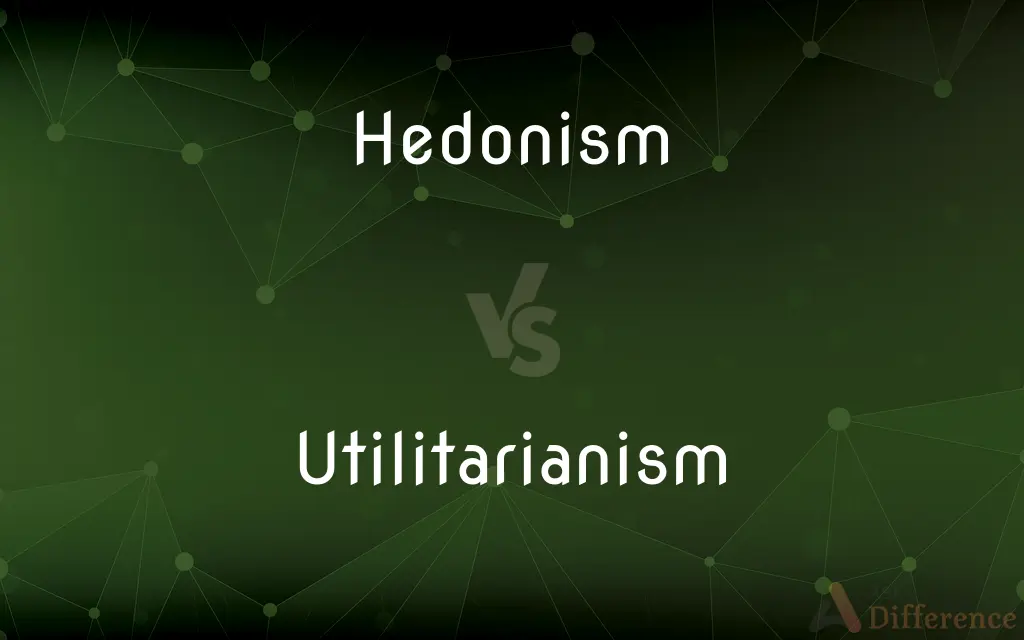Hedonism vs. Utilitarianism — What's the Difference?
By Tayyaba Rehman — Updated on September 16, 2023
Hedonism is a philosophical view that pleasure or happiness is the only intrinsic good, focusing on individual enjoyment. Utilitarianism is a broader ethical theory advocating actions that maximize overall happiness.

Difference Between Hedonism and Utilitarianism
Table of Contents
ADVERTISEMENT
Key Differences
Hedonism is a philosophical perspective centered around the pursuit of pleasure and happiness as the ultimate goal of life. Utilitarianism, while also concerned with happiness, is a more complex ethical framework that seeks to maximize happiness or utility for the greatest number of people. In Hedonism, the focus is largely on individual pleasure, whether physical or emotional. Utilitarianism, in contrast, often involves ethical calculus to determine actions that bring about the most overall good.
Both Hedonism and Utilitarianism can be traced back to ancient philosophical discussions but have evolved over time to adapt to modern ethical concerns. Hedonism is often linked with individualistic and sometimes even selfish pursuits of pleasure. Utilitarianism strives for a collective benefit, emphasizing societal needs and often requiring individual sacrifices for greater communal benefits. Hedonism may not concern itself with the ethical implications of one's actions on others, while Utilitarianism explicitly does.
Hedonism is often critiqued for potentially leading to excess and disregard for societal norms or ethical considerations. Utilitarianism, on the other hand, is critiqued for sometimes justifying morally questionable actions if they serve a greater good. For instance, Hedonism might justify indulging in a luxury solely for personal enjoyment, regardless of the expense. Utilitarianism might justify the same expense if it somehow leads to a greater societal benefit, like job creation.
In summary, while both Hedonism and Utilitarianism consider happiness a crucial aspect of human existence, they diverge significantly in scope and application. Hedonism is more focused on individual pleasure and does not inherently concern itself with the broader ethical implications. Utilitarianism aims for the maximization of happiness but often at the cost of individual pleasures for a more substantial, collective good.
Comparison Chart
Focus
Individual pleasure
Collective happiness
ADVERTISEMENT
Ethical Concerns
Often disregards
Central to the theory
Complexity
Generally simpler
Involves ethical calculus
Societal Impact
May be individualistic or selfish
Aims for societal benefit
Historical Roots
Ancient, with Epicurean and Cyrenaic schools
Developed further in modern philosophy, e.g., Bentham, Mill
Compare with Definitions
Hedonism
A philosophy prioritizing pleasure as life's ultimate goal.
His lifestyle of constant partying reflected Hedonism.
Utilitarianism
An ethical theory that promotes the greatest happiness for the greatest number.
Utilitarianism would advocate for policies benefiting the majority.
Hedonism
A focus on personal happiness, often to the exclusion of other considerations.
Her Hedonism made her indifferent to others' suffering.
Utilitarianism
An approach that evaluates actions based on their consequences.
Utilitarianism would assess a law by its impact on societal well-being.
Hedonism
The belief that what is pleasurable is inherently good.
Hedonism argues that pleasure, in itself, is morally good.
Utilitarianism
A framework advocating collective benefit over individual interests.
In Utilitarianism, individual sacrifices may be required for the greater good.
Hedonism
An ethical standpoint rooted in sensory or emotional pleasure.
Hedonism often justifies indulging in luxuries.
Utilitarianism
A philosophical position focused on maximizing overall utility or happiness.
Utilitarianism justifies sacrifices for a greater communal good.
Hedonism
The doctrine that pleasure is the primary good.
In Hedonism, the pursuit of pleasure justifies itself.
Utilitarianism
The doctrine of utility as the principle of ethical action.
Utilitarianism often involves complex ethical calculations.
Hedonism
Hedonism refers to a family of theories, all of which have in common that pleasure plays a central role in them. Psychological or motivational hedonism claims that our behavior is determined by desires to increase pleasure and to decrease pain.
Utilitarianism
Utilitarianism is a family of normative ethical theories that prescribe actions that maximize happiness and well-being for all affected individuals. Although different varieties of utilitarianism admit different characterizations, the basic idea behind all of them is to in some sense maximize utility, which is often defined in terms of well-being or related concepts.
Hedonism
The pursuit of pleasure; sensual self-indulgence.
Utilitarianism
The belief that the value of a thing or an action is determined by its utility.
Hedonism
Pursuit of or devotion to pleasure, especially to the pleasures of the senses.
Utilitarianism
The ethical theory proposed by Jeremy Bentham and James Mill that all action should be directed toward achieving the greatest happiness for the greatest number of people.
Hedonism
(Philosophy) The ethical doctrine holding that only what is pleasant or has pleasant consequences is intrinsically good.
Utilitarianism
The quality of being utilitarian
Housing of bleak utilitarianism.
Hedonism
(Psychology) The doctrine holding that behavior is motivated by the desire for pleasure and the avoidance of pain.
Utilitarianism
(philosophy) A system of ethics based on the premise that something's value may be measured by its usefulness.
Hedonism
The belief that pleasure or happiness is the highest good in life. Some hedonists, such as the Epicureans, have insisted that pleasure of the entire mind, not just pleasure of the senses, is the highest good.
Utilitarianism
(philosophy) The theory that action should be directed toward achieving the "greatest happiness for the greatest number of people" (hedonistic universalism), or one of various related theories.
Hedonism
(countable) A general devotion to the pursuit of pleasure.
Utilitarianism
The doctrine that the greatest happiness of the greatest number should be the end and aim of all social and political institutions.
Hedonism
The doctrine of the Hedonic sect; the pursuit of pleasure as a matter of ethical principle.
Utilitarianism
The doctrine that virtue is founded in utility, or that virtue is defined and enforced by its tendency to promote the highest happiness of the universe.
Hedonism
The ethical theory which finds the explanation and authority of duty in its tendency to give pleasure.
Utilitarianism
The doctrine that utility is the sole standard of morality, so that the rectitude of an action is determined by its usefulness.
Hedonism
The pursuit of pleasure as a matter of ethical principle
Utilitarianism
Doctrine that the useful is the good; especially as elaborated by Jeremy Bentham and James Mill; the aim was said to be the greatest happiness for the greatest number
Hedonism
An ethical system that evaluates the pursuit of pleasure as the highest good
Common Curiosities
Is Hedonism considered selfish?
Hedonism can be seen as individualistic or even selfish in its focus on personal pleasure.
What is Utilitarianism?
Utilitarianism is an ethical theory advocating for actions that maximize overall happiness.
What is Hedonism?
Hedonism is the philosophical view that pleasure or happiness is the ultimate good.
Does Utilitarianism focus on collective happiness?
Yes, Utilitarianism aims to maximize happiness for the greatest number.
Does Utilitarianism consider individual happiness?
Utilitarianism considers the happiness or well-being of all, often at the expense of individual pleasure.
Are there religious forms of Hedonism?
Hedonism is generally considered secular, although some religious teachings align with the pursuit of pleasure or happiness.
Does Hedonism focus on individual pleasure?
Yes, Hedonism primarily focuses on individual pleasure.
Is Hedonism inherently selfish?
Critics argue it can be, but some forms of Hedonism posit that one's own happiness can lead to others' happiness.
What's the main focus of Utilitarianism?
Utilitarianism focuses on the well-being or happiness of a community or population.
Does Utilitarianism align with any religious teachings?
Utilitarianism is often compatible with religious teachings that emphasize community well-being, though it is fundamentally a secular theory.
Is Hedonism only about physical pleasure?
No, Hedonism can encompass both physical and emotional forms of pleasure.
Is Utilitarianism about the greater good?
Yes, Utilitarianism aims to maximize happiness or well-being for the greatest number of people.
What's the main focus of Hedonism?
Hedonism primarily focuses on individual happiness and pleasure.
Share Your Discovery

Previous Comparison
Backbone vs. Skeleton
Next Comparison
Dreadlocks vs. CornrowsAuthor Spotlight
Written by
Tayyaba RehmanTayyaba Rehman is a distinguished writer, currently serving as a primary contributor to askdifference.com. As a researcher in semantics and etymology, Tayyaba's passion for the complexity of languages and their distinctions has found a perfect home on the platform. Tayyaba delves into the intricacies of language, distinguishing between commonly confused words and phrases, thereby providing clarity for readers worldwide.














































